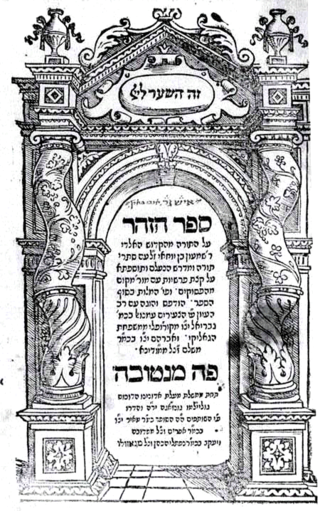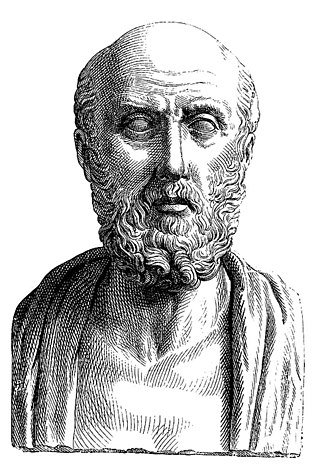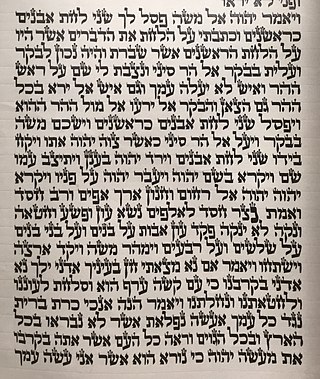Related Research Articles

Moses ben Maimon (1138–1204), commonly known as Maimonides and also referred to by the Hebrew acronym Rambam, was a Sephardic rabbi and philosopher who became one of the most prolific and influential Torah scholars of the Middle Ages. In his time, he was also a preeminent astronomer and physician, serving as the personal physician of Saladin. He was born and lived in Córdoba within the Almoravid Empire, on Passover eve, 1138, until his family was expelled for refusing to convert to Islam. Later, he lived in Morocco and Egypt and worked as a rabbi, physician and philosopher.

Judaism considers some names of God so holy that, once written, they should not be erased: יהוה, אֲדֹנָי, אֵל, אֱלֹהִים, שַׁדַּי, and צְבָאֽוֹת ; some also include I Am that I Am. Early authorities considered other Hebrew names mere epithets or descriptions of God, and wrote that they and names in other languages may be written and erased freely. Some moderns advise special care even in these cases, and many Orthodox Jews have adopted the chumras of writing "G-d" instead of "God" in English or saying Ṭēt-Vav instead of Yōd-Hē for the number fifteen or Ṭēt-Zayin instead of Yōd-Vav for the Hebrew number sixteen.

The Zohar is a foundational work of Kabbalistic literature. It is a group of books including commentary on the mystical aspects of the Torah and scriptural interpretations as well as material on mysticism, mythical cosmogony, and mystical psychology. The Zohar contains discussions of the nature of God, the origin and structure of the universe, the nature of souls, redemption, the relationship of Ego to Darkness and "true self" to "The Light of God".

The Hippocratic Oath is an oath of ethics historically taken by physicians. It is one of the most widely known of Greek medical texts. In its original form, it requires a new physician to swear, by a number of healing gods, to uphold specific ethical standards. The oath is the earliest expression of medical ethics in the Western world, establishing several principles of medical ethics which remain of paramount significance today. These include the principles of medical confidentiality and non-maleficence. As the seminal articulation of certain principles that continue to guide and inform medical practice, the ancient text is of more than historic and symbolic value. It is enshrined in the legal statutes of various jurisdictions, such that violations of the oath may carry criminal or other liability beyond the oath's symbolic nature.

There is no established formulation of principles of faith that are recognized by all branches of Judaism. Central authority in Judaism is not vested in any one person or group - although the Sanhedrin, the supreme Jewish religious court, would fulfill this role if it were re-established - but rather in Judaism's sacred writings, laws, and traditions.

Moses ben Nachman, commonly known as Nachmanides, and also referred to by the acronym Ramban and by the contemporary nickname Bonastruc ça Porta, was a leading medieval Jewish scholar, Catalan rabbi, philosopher, physician, kabbalist, and biblical commentator. He was raised, studied, and lived for most of his life in Girona, Catalonia. He is also considered to be an important figure in the re-establishment of the Jewish community in Jerusalem following its destruction by the Crusaders in 1099.
Adherents of Judaism believe that Jesus of Nazareth was not the Messiah nor "the Son of God". In the Jewish perspective, it is believed that the way Christians see Jesus goes against monotheism, a belief in the absolute unity and singularity of God, which is central to Judaism; the worship of a person is seen by them as a form of idolatry. Therefore, considering Jesus divine, as “God the Son”, is forbidden according to Judaism. Judaism's rejection of Jesus as the Messiah is based on Jewish eschatology, which holds that the coming of the true Messiah will be associated with events that have not yet occurred, such as the rebuilding of The Temple, a Messianic Age of peace, and the ingathering of Jews to their homeland.

Targum Onkelos is the primary Jewish Aramaic targum ("translation") of the Torah, accepted as an authoritative translated text of the Five Books of Moses and thought to have been written in the early second century CE.
The Dardaim or Dor Daim, are adherents of the Dor Deah movement in Orthodox Judaism. That movement took its name in 1912 in Yemen under Rabbi Yiḥyah Qafiḥ, and had its own network of synagogues and schools, although, in actuality, the movement existed long before that name had been coined for it. According to ethnographer and historian, Shelomo Dov Goitein, author and historiographer, Hayyim Habshush had been a member of this movement before it had been given the name Dor Deah, writing, “...He and his friends, partly under European influence, but driven mainly by developments among the Yemenite Jews themselves, formed a group who ardently opposed all those forces of mysticism, superstition and fatalism which were then so prevalent in the country and strove for exact knowledge and independent thought, and the application of both to life.” It was only some years later, when Rabbi Yihya Qafih became the headmaster of the new Jewish school in Sana'a built by the Ottoman Turks and where he wanted to introduce a new curriculum in the school whereby boys would also learn arithmetic and the rudiments of the Arabic and Turkish languages that Rabbi Yihya Yitzhak Halevi gave to Rabbi Qafih's movement the name Daradʻah, a word which is an Arabic broken plural made-up of the Hebrew words Dör Deʻoh, and which means "Generation of Knowledge."
The Hebrew Bible makes reference to a number of covenants with God (YHWH). These include the Noahic Covenant set out in Genesis 9, which is decreed between God and all living creatures, as well as a number of more specific covenants with Abraham, the whole Israelite people, the Israelite priesthood, and the Davidic lineage of kings. In form and terminology, these covenants echo the kinds of treaty agreements existing in the surrounding ancient world.
Jedaiah ben Abraham Bedersi was a Jewish poet, physician, and philosopher; born at Béziers. His Occitan name was En Bonet, which probably corresponds to the Hebrew name Tobiah; and, according to the practices of Hachmei Provence, he occasionally joined to his name that of his father, Abraham Bedersi.

Jewish meditation includes practices of settling the mind, introspection, visualization, emotional insight, contemplation of divine names, or concentration on philosophical, ethical or mystical ideas. Meditation may accompany unstructured, personal Jewish prayer, may be part of structured Jewish services, or may be separate from prayer practices. Jewish mystics have viewed meditation as leading to devekut. Hebrew terms for meditation include hitbodedut or hitbonenut/hisbonenus ("contemplation").

Psalm 90 is the 90th psalm of the Book of Psalms, beginning in English in the King James Version: "Lord, thou hast been our dwelling place in all generations". In the slightly different numbering system used in the Greek Septuagint and Latin Vulgate translations of the Bible, this psalm is Psalm 89. In Latin, it is known as "Domine refugium tu factus es nobis in generatione et generatione". It is the opening psalm of Book 4 of the psalms. Uniquely among the Psalms, it is attributed to Moses. It is well known for its reference in verse 10 to human life expectancy being 70 or 80 : it is believed that this verse was the influence for the opening words of Abraham Lincoln's Gettysburg Address.

The Thirteen Attributes of Mercy or Shelosh-'Esreh Middot HaRakhamim as enumerated in the Book of Exodus in Parasha Ki Tissa are the Divine Attributes with which, according to Judaism, God governs the world.

Psalm 138 is the 138th psalm of the Book of Psalms, beginning in English in the King James Version: "I will praise thee with my whole heart". In Latin, it is known as "Confitebor tibi Domine in toto corde meo". The psalm is a hymn psalm.

Psalm 54 is the 54th psalm of the Book of Psalms, beginning in English in the King James Version: "Save me, O God, by thy name, and judge me by thy strength". In the slightly different numbering system used in the Greek Septuagint and Latin Vulgate translations of the Bible, this psalm is Psalm 53. In Latin, it is known as "Deus in nomine tuo salvum me fac", Attributed to David, it was written for one who finds oneself betrayed by a friend.

Psalm 57 is the 57th psalm of the Book of Psalms, beginning in English in the King James Version: "Be merciful unto me, O God, be merciful unto me". In the slightly different numbering system of the Greek Septuagint version of the Bible and the Latin Vulgate, this psalm is Psalm 56. In Latin, it is known as " Miserere mei Deus". It is attributed to King David, and is described as a Michtam of David, when he fled from the face of Saul, in the cave, recalling either the cave of Adullam, or the cave in the wilderness of En-gedi, on the western shore of the Dead Sea.
The Torah distinguishes two types of enticers to idolatry: mesit is a Jew who seduces an individual to idolatry, while a madiach (מדיח) is someone who publicly entices many into idolatry. An enticer to idolatry may be both. Enticement to idolatry in Judaism is a capital offence under the Law of Moses.

"Geh aus, mein Herz, und suche Freud" is a summer hymn with a text in German by theologian Paul Gerhardt written in 1653. It was first published that same year in the fifth edition of Johann Crüger's hymnal Praxis pietatis melica. It was sung to several melodies, the most popular one composed by August Harder, and later became a Volkslied in an abridged version.
The Osteopathic Oath is an oath commonly administered to osteopathic physicians who practice osteopathic medicine in the United States. Similar to the Hippocratic Oath, it is a statement of professional values and ethics. The first version of the oath was created in 1938, and the current version of the oath has been in use since 1954. Although taking the oath is not required or legally binding, it is commonly seen as a rite of passage.
References
- ↑ Tan, S. Y.; Yeow, M. E. (2002). "Moses Maimonides (1135-1204): Rabbi, Philosopher, Physician" (PDF). Singapore Med J. Retrieved 24 March 2012.
- ↑ "Täglisches Gebet eines Arztes bevor en seine Kranken besucht -- Aus der hebräischen Handschrift eines berühmten jüdischen Arztes in Egypten aus dem zwölften Jahrhundert," Deutsches Museum, 1783, 1: 43-45
- ↑ Davies, Martin L. (1995). Identity or History? Marcus Herz and the End of the Enlightenment. Detroit: Wayne State University Press. ISBN 9780814324349. OCLC 32391459.
- ↑ F. Rosner, "The Physician's Prayer Attributed to Moses Maimonides," Bulletin of the History of Medicine, vol. 41, no. 5 (September-October 1967), pp. 450-454
- ↑ "Tfila le-rofeh" Ha-Meassef, 1790, 6: 242-244